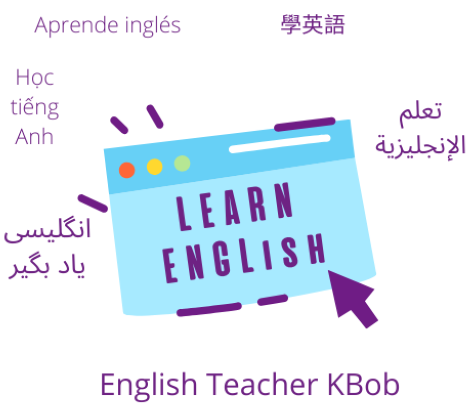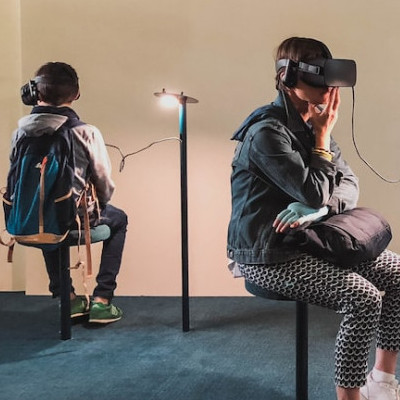 Verbs in English, and probably other languages as well, have three tenses: Present, past, & future. This lesson is about how to conjugate the verb be in the past & future tenses.
Verbs in English, and probably other languages as well, have three tenses: Present, past, & future. This lesson is about how to conjugate the verb be in the past & future tenses.
We learned about the present tense in an earlier lesson.
Refer to the pictured chart below to help you understand.
Let’s begin with the past tense.
What’s The Difference?
 In many ways, there is no difference, although it’s vitally important that you understand how the verb be changes depending on who or what the subject is.
In many ways, there is no difference, although it’s vitally important that you understand how the verb be changes depending on who or what the subject is.
If the subject is:
I, instead of am in the present tense, it changes to was.
we, you, or they, instead of are in the present tense, it changes to were
he, she, or it, instead of is in the present tense, it changes to was
Keep in mind that I, we, you, they, he, she, and it are all pronouns. Remember, pronouns take the place of nouns. Therefore, the nouns that they replace, in all three tenses can be used and the words for the tenses in the verb be remain the same.
Also, keep in mind that the noun that the pronoun I replaces will always be your own name.
For example, I can say we were at the park. I can also say Maria and I were at the park and it means the same thing.
We is always about someone or something else and I am always included.
I can also say you were at the park or I can say you and Maria were at the park and it will mean the same thing.
Keep in mind that the word you can be used in reference to only one person (the person I’m addressing) or it can be used to describe the person I’m addressing and one or more people or things.
Another example: I could says she was at the park or I could say Maria was at the park and it means the same thing.
There are other variations but that’s all I will mention for now. The point is, you can use the nouns and the pronouns that replace those nouns interchangably and the sentence(s) mean the same.
However, it’s also important to remember that before using pronouns, it needs to be clear which noun the pronoun is replacing. If I say he, she, or they, we need to know who he, she, or they is before we use those pronouns.
Does Anything Else Change?
 The answer is yes and no.
The answer is yes and no.
Like in the present tense, when we ask a question instead of making a statement, we put the verb be in front of the subject, whereas in statements, the verb comes after the subject.
So, that’s the yes part or my answer–the part that changes.
The no part of my answer is, that nothing else changes except for the punctuation at the end of the sentence. At the end of a statement, we end with a period (.). At the end of a question, we use a question mark (?).
For example, if the statement is she was in the park, to make the sentence a question, it would be was she in the park?
It’s the same for each of the pronouns and whoever or whatever the subject is.
We put the verb after the subject in a statement and we put the subject after the verb in a question.
Also, we use the word not to make a negative statement, just like in present tense.
What About Future Tense?
 It’s simple, but many students get confused with future tense.
It’s simple, but many students get confused with future tense.
Let’s have a look.
The future tense for the verb be is will be. That’s simple
For example, instead of saying, she is in the park (present), she was in the park (past), we say, she will be in the park (future).
The same holds true if we use nouns instead of pronouns as the subject.
For future tense, we could say, Maria will be in the park.
If we use any of the other pronouns (I, you, we, they, he, she, or it) and any noun as the subject, in future tense, it’s will be for all of them.
We use not to make negative statements in the future tense, but we put the word not between will and be.
For example, she will not be in the park
Got it?
That’s great!
Here’s where some students get confused.
What About Questions In Future Tense?
 Like in present and past tense, when we ask a question in future tense, the subject comes after the verb. The problem is, only half of the verb goes before the subject and the other half goes after the subject.
Like in present and past tense, when we ask a question in future tense, the subject comes after the verb. The problem is, only half of the verb goes before the subject and the other half goes after the subject.
For example, Insted of asking, is she in the park (present) or was she in the park (past), we say, will she be in the park?
The same is true if you use a noun instead of a pronoun as the subject. For example, will Maria be in the park?
It’s a simple thing. I suggest that you don’t over-think it and just accept it for what it is.
The good thing is, although there is at least one variation for the future tense, there are no exceptions. It’s the same all the time. It’s rare to be able to say that about most things in English
To Wrap It Up
 As with all verbs in English, probably in other languages as well, there are three tenses:
As with all verbs in English, probably in other languages as well, there are three tenses:
- Present
- Past
- Future
In a previous lesson, we learned how to conjugate the verb be in the present tense. In this lesson, we learned about how to do it in the past and future tense.
I know it can be a little confusing to do so in the future tense but I hope this lesson helps you and that you will learn the proper way from the beginning.
Leave questions and comments in the box below. I will promptly reply.
Answer the following questions to show me you have learned this lesson:
Are you learning English from my lessons?
Were you learning English before my lessons?
Will you be learning more English if you continue?
Make a statement using the verb be in the present, past, or future tense, then make it a question.
You can do it. I know you can.
Practice changing from present to past and future tenses.
Watch YouTube video that corresponds to this lesson.


Hey there, EnglishTeacherKBob! I’ve just delved into your piece on conjugating the verb ‘be’ in various tenses, and I must say, it’s a masterclass in clarity! How you’ve broken down the intricacies of the past and future tenses, especially the nuances of forming questions in the future tense, is respectable. Often, these ‘simple’ verbs can trip up learners, but your approach makes it all seem so graspable. I particularly appreciate the practical exercises at the end, pushing readers to apply what they’ve learned. It’s evident you have a passion for teaching and ensuring your readers truly understand the content. Keep up the fantastic work, and I’m eagerly awaiting more lessons from you! 📖
Hi Makhsud. Thanks for your kind words. I’m glad you found the lesson understandable. Feel free to check back any time as I am constantly adding new content. Also, feel free to leave comments and questions on my site. I will promptly respond.
(K)Bob